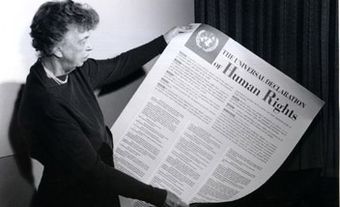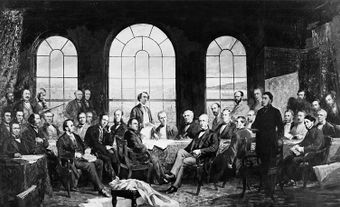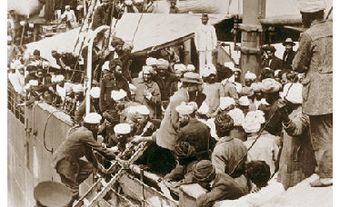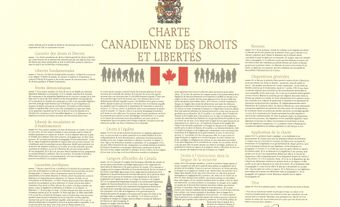Jim Keegstra was a secondary school teacher in rural Alberta who taught anti-Semitic propaganda to his students. He was charged with a hate crime in 1984 and was found guilty in 1985. However, Keegstra launched repeated appeals arguing that the Criminal Code violated his constitutionally guaranteed freedom of expression. The landmark case (R. v. Keegstra) tested the balance between the right to freedom of speech outlined in the Canadian Charter of Rights and Freedoms and the law’s limits on hate speech stipulated in the Criminal Code. The case came before the Supreme Court of Canada in 1990 and 1996. The Court ultimately ruled against Keegstra by deciding that Canada’s hate laws imposed a “reasonable limit” on a person’s freedom of expression.

Background
James “Jim” Keegstra was born in Vulcan, Alberta, in 1934. He worked as a farmhand and as a mechanic before attending university. He then became a junior high and secondary school teacher in Eckville, a small town just west of Red Deer. He also served on town council and was elected mayor in 1974.
In December 1981, a school district superintendent responded to multiple complaints from parents and a school board trustee. They discovered that, for more than a decade, Keegstra had been teaching students that the Holocaust — in which Nazi Germany murdered six million European Jews — was a hoax. He had also referred to Jewish people using ugly, disparaging terms and claimed that Jews were trying to take over the world through internationally organized plots.
Keegstra was warned to stop teaching his racist, anti-Semitic views and obviously false conspiracy theories, but he refused. On 7 December 1982, Keegstra’s 14-year teaching career ended with his dismissal and expulsion from the Alberta Teachers Association.
First Trial
In January 1984, Keegstra was charged with criminally promoting hatred against an identifiable group according to section 281 (2) — now section 319 (2) — of the Criminal Code of Canada. It stated, in part, “Everyone who, by communicating statements, other than in private conversation, wilfully promotes hatred against any identifiable group is guilty of an indictable offence and is liable to imprisonment for a term not exceeding two years.”
Keegstra asked that the charge be dismissed because everything he told his students was protected by section 2 (b) of the Canadian Charter of Rights and Freedoms. Section 2 (b) is often referred to as the freedom of expression clause. It states, in part, “Everyone has the following fundamental freedoms: freedom of thought, belief, opinion and expression, including freedom of the press and other media of communication.”
Keegstra’s 70-day trial concluded on 20 July 1985. The jury rejected Keegstra’s Charter argument and convicted him of violating the Criminal Code. He was fined $5,000. However, Keegstra appealed to the Alberta Court of Appeal. It agreed with his Charter argument and struck down his conviction.

Appeals to the Supreme Court
In 1990, appeals from the Crown brought R. v. Keegstra to the Supreme Court of Canada. The case tested the extent to which an individual could publicly express an opinion, even if that opinion promoted hatred of a group of people. Section 1 of the Charter of Rights and Freedoms attempted to balance the rights of individuals with the rights of groups within society; it states that the freedoms it defines are “subject only to such reasonable limits prescribed by law as can be demonstrably justified in a free and democratic society.”
All seven presiding justices ruled that the Criminal Code’s proscription on hate speech had indeed violated Keegstra’s freedom of expression, as protected by section 2 (b) of the Charter. However, four justices also stated that the law Keegstra had broken by expressing his anti-Semitic beliefs represented a “reasonable limit” on a citizen’s freedom of expression. They argued that any speech that tried to persuade others to hate a particular group of people might lead to psychological harm or even physical violence. The other three justices argued that the Criminal Code’s hate law restricted freedom of expression too much. However, the majority ruled; the Supreme Court of Canada asked the Alberta Court of Appeal to reconsider its opinion on the Keegstra conviction. The Alberta court ordered a new trial.

Second Trial
Keegstra’s second trial concluded on 10 July 1992. He was once again found guilty of a hate crime and was ordered to pay a $3,000 fine. Keegstra refused to accept the verdict and again appealed to the Alberta Court of Appeal. He claimed that the judge had made legal mistakes in his responses to jury questions. The Alberta Court of Appeal agreed and quashed his conviction. However, the Crown appealed that decision, so the case was once again on its way to the Supreme Court.
Return to Supreme Court
In March 1996, the Supreme Court heard from Keegstra’s lawyer, who argued that Keegstra’s Charter right to be presumed innocent was violated by section 319 of the Criminal Code. The justices decided it was not necessary to hear from the Crown and ruled that the Charter violation was reasonable and the Court’s earlier decision would stand. As a result, the Alberta court’s 1992 conviction would stand. In October 1996, the Alberta court imposed a one-year suspended sentence on Keegstra, along with 200 hours of community service and one year of probation.

Legacy
In 1983, Keegstra ran for re-election as mayor of Eckville, but lost. He eventually moved to Red Deer, where he worked as a farmer and a custodian. He refused all interview requests and died on 2 June 2014 at the age of 80.
The Keegstra case was the first successful conviction under the hate speech provisions of the Criminal Code. The legal battles that the Keegstra case initiated demonstrate the delicate balance that exists in Canada with respect to a citizen’s ability to publicly express opinions and society’s ability to protect itself from the promotion of hatred. The Keegstra case also revealed an undercurrent of racism and hatred toward minority groups in Canadian society, as well as the limits of the law and the constitution in combatting it.
See also Maclean’s Article: Keegstra’s Conviction Confirmed; Hate Propaganda; Human Rights; Fake News (a.k.a. Disinformation) in Canada; Constitution of Canada; Constitutional History of Canada.

 Share on Facebook
Share on Facebook Share on X
Share on X Share by Email
Share by Email Share on Google Classroom
Share on Google Classroom






